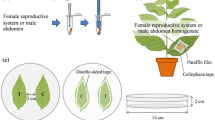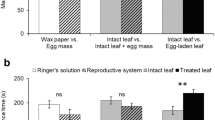Abstract
Plants exhibit various defense mechanisms against pathogens and herbivores, which are induced by pathogen/herbivore-derived elicitors. Ascogaster reticulata (Hymenoptera: Braconidae) is an egg-larval parasitoid of the smaller tea tortrix moth Adoxophyes honmai (Lepidoptera: Tortricidae), a serious pest moth of tea plants. In tea plants, egg deposition by A. honmai induces tea leaves to arrest A. reticulata. In a previous study, homogenate of the whole reproductive system from female moths showed elicitor activity that induced tea plant responses. The present study aimed to understand the elicitor-mediated interactions among the tea plant, A. honmai moth, and A. reticulata parasitoid to clarify the elicitor-secreting organs and characterize the elicitors. Investigation of elicitor activity that induced tea leaves to arrest parasitoids in leaves treated with homogenates of each organ of the reproductive system revealed the elicitor activity only in leaves treated with the homogenates of accessory glands, but not those of other organs. Furthermore, proteinase treatment of accessory gland homogenates resulted in loss of elicitor activity. These results suggest that elicitors derived from egg deposition by A. honmai, which induce tea leaves to arrest parasitoids, are proteinaceous compounds specifically contained in the accessory glands of female moths. Our findings contribute to identifying the elicitors and the application of biological control in tea fields.




Similar content being viewed by others
Data availability
The data supporting the conclusions of this article are included in this published article. The datasets generated during and/or analyzed during the current study are available from the corresponding author on reasonable request.
References
Arai H, Ishitsubo Y, Nakai M, Inoue MN (2022) A simple method to disperse eggs from lepidopteran scalelike egg masses and to observe embryogenesis. Entomol Sci 25:e12497. https://doi.org/10.1111/ens.12497
Bandoly M, Hilker M, Steppuhn A (2015) Oviposition by Spodoptera exigua on Nicotiana attenuata primes induced plant defence against larval herbivory. Plant J 83:661–672. https://doi.org/10.1111/tpj.12918
Bertea CM, Casacci LP, Bonelli S, Zampollo A, Barbero F (2019) Chemical, physiological and molecular responses of host plants to lepidopteran egg-laying. Front Plant Sci 10:1768. https://doi.org/10.3389/fpls.2019.01768
Blenn B, Bandoly M, Küffner A, Otte T, Geiselhardt S, Fatouros NE, Hilker M (2012) Insect egg deposition induces indirect defense and epicuticular wax changes in Arabidopsis thaliana. J Chem Ecol 38:882–892. https://doi.org/10.1007/s10886-012-0132-8
Blum MS (1985) Fundamentals of insect physiology. Wiley, New York
Büchel K, Malskies S, Mayer M, Fenning TM, Gershenzon J, Hilker M, Meiners T (2011) How plants give early herbivore alert: volatile terpenoids attract parasitoids to egg-infested elms. Basic Appl Ecol 12:403–412. https://doi.org/10.1016/j.baae.2011.06.002
Crawley MJ (2007) The R Book. Wiley, Chichester
Deshpande SA, Kainoh Y (2012) Herbivore egg deposition induces tea leaves to arrest the egg-larval parasitoid Ascogaster reticulata. Entomol Exp Appl 144:172–180. https://doi.org/10.1111/j.1570-7458.2012.01275.x
Desurmont GA, Weston PA (2011) Aggregative oviposition of a phytophagous beetle overcomes egg-crushing plant defences. Ecol Entomol 36:335–343. https://doi.org/10.1111/j.1365-2311.2011.01277.x
Doss RP, Oliver JE, Proebsting WM, Potter SW, Kuy S, Clement SL, Williamson RT, Carney JR, DeVilbiss ED (2000) Bruchins: insect-derived plant regulators that stimulate neoplasm formation. Proc Natl Acad Sci USA 97:6218–6223. https://doi.org/10.1073/pnas.110054697
Faraway JJ (2006) Extending the linear model with R: generalized linear, mixed effects and nonparametric regression models. Chapman & Hall/CRC, Boca Raton
Fatouros NE, Broekgaarden C, Bukovinszkine’Kiss G, van Loon JJ, Mumm R, Huigens ME, Dicke M, Hilker M (2008) Male-derived butterfly anti-aphrodisiac mediates induced indirect plant defense. Proc Natl Acad Sci USA 105:10033–10038. https://doi.org/10.1073/pnas.0707809105
Fatouros NE, Pashalidou FG, Aponte Cordero WV, van Loon JJ, Mumm R, Dicke M, Hilker M, Huigens ME (2009) Anti-aphrodisiac compounds of male butterflies increase the risk of egg parasitoid attack by inducing plant synomone production. J Chem Ecol 35:1373–1381. https://doi.org/10.1007/s10886-009-9714-5
Fatouros NE, Lucas-Barbosa D, Weldegergis BT, Pashalidou FG, van Loon JJ, Dicke M, Harvey JA, Gols R, Huigens ME (2012) Plant volatiles induced by herbivore egg deposition affect insects of different trophic levels. PLoS ONE 7:e43607. https://doi.org/10.1371/journal.pone.0043607
Geiselhardt S, Yoneya K, Blenn B, Drechsler N, Gershenzon J, Kunze R, Hilker M (2013) Egg laying of cabbage white butterfly (Pieris brassicae) on Arabidopsis thaliana affects subsequent performance of the larvae. PLoS ONE 8:e59661. https://doi.org/10.1371/journal.pone.0059661
Gouhier-Darimont C, Stahl E, Glauser G, Reymond P (2019) The Arabidopsis lectin receptor kinase LecRK-I.8 is involved in insect egg perception. Front Plant Sci 10:623. https://doi.org/10.3389/fpls.2019.00623
Groux R, Stahl E, Gouhier-Darimont C, Kerdaffrec E, Jimenez-Sandoval P, Santiago J, Reymond P (2021) Arabidopsis natural variation in insect egg-induced cell death reveals a role for lectin receptor kinase-I.1. Plant Physiol 185:240–255. https://doi.org/10.1093/plphys/kiaa022
Hilker M, Meiners T (2006) Early herbivore alert: insect eggs induce plant defense. J Chem Ecol 32:1379–1397. https://doi.org/10.1007/s10886-006-9057-4
Hilker M, Meiners T (2011) Plants and insect eggs: how do they affect each other? Phytochemistry 72:1612–1623. https://doi.org/10.1016/j.phytochem.2011.02.018
Hilker M, Fatouros NE (2015) Plant responses to insect egg deposition. Annu Rev Entomol 60:493–515. https://doi.org/10.1146/annurev-ento-010814-020620
Hilker M, Stein C, Schröder R, Varama M, Mumm R (2005) Insect egg deposition induces defence responses in Pinus sylvestris: characterisation of the elicitor. J Exp Biol 208:1849–1854. https://doi.org/10.1242/jeb.01578
Hundacker J, Bittner N, Weise C, Bröhan G, Varama M, Hilker M (2022) Pine defense against eggs of an herbivorous sawfly is elicited by an annexin-like protein present in egg-associated secretion. Plant Cell Environ 45:1033–1048. https://doi.org/10.1111/pce.14211
Lum PTM (1984) Ultrastructure of the bulla seminalis in Cadra cautella walker (Pyralidae: Lepidoptera). Int J Insect Morphol Embryol 13:303–309. https://doi.org/10.1016/0020-7322(84)90005-9
Meiners T, Hilker M (2000) Induction of plant synomones by oviposition of a phytophagous insect. J Chem Ecol 26:221–232. https://doi.org/10.1023/A:1005453830961
Pascini TV, Martins GF (2017) The insect spermatheca: an overview. Zoology (jena) 121:56–71. https://doi.org/10.1016/j.zool.2016.12.001
Pashalidou FG, Lucas-Barbosa D, van Loon JJA, Dicke M, Fatouros NE (2013) Phenotypic plasticity of plant response to herbivore eggs: effects on resistance to caterpillars and plant development. Ecology 94:702–713. https://doi.org/10.1890/12-1561.1
Pashalidou FG, Gols R, Berkhout BW, Weldegergis BT, van Loon JJA, Dicke M, Fatouros NE (2015) To be in time: egg deposition enhances plant-mediated detection of young caterpillars by parasitoids. Oecologia 177:477–486. https://doi.org/10.1007/s00442-014-3098-0
Piyasaengthong N, Kinoshita N, Sato Y, Kainoh Y (2016a) Sex-specific elicitor from Adoxophyes honmai (Lepidoptera: Tortricidae) induces tea leaf to arrest the egg–larval parasitoid Ascogaster reticulata (Hymenoptera: Braconidae). Appl Entomol Zool 51:353–362. https://doi.org/10.1007/s13355-016-0407-6
Piyasaengthong N, Sato Y, Kinoshita N, Kainoh Y (2016b) Oviposition preference for leaf age in the smaller tea tortrix Adoxophyes honmai (Lepidoptera: Tortricidae) as related to performance of neonates. Appl Entomol Zool 51:363–371. https://doi.org/10.1007/s13355-016-0408-5
Qazi MCB, Heifetz Y, Wolfner MF (2003) The developments between gametogenesis and fertilization: ovulation and female sperm storage in Drosophila melanogaster. Dev Biol 256:195–211. https://doi.org/10.1016/S0012-1606(02)00125-2
Reymond P (2013) Perception, signaling and molecular basis of oviposition-mediated plant responses. Planta 238:247–258. https://doi.org/10.1007/s00425-013-1908-y
Reymond P (2021) Receptor kinases in plant responses to herbivory. Curr Opin Biotechnol 70:143–150. https://doi.org/10.1016/j.copbio.2021.04.004
Salerno G, De Santis F, Iacovone A, Bin F, Conti E (2013) Short-range cues mediate parasitoid searching behavior on maize: the role of oviposition-induced plant synomones. Biol Control 64:247–254. https://doi.org/10.1016/j.biocontrol.2012.12.004
Schoonhoven LM, Van Loon JJ, Dicke M (2005) Insect-plant biology. Oxford University Press, Oxford
Stahl E, Brillatz T, Ferreira Queiroz E, Marcourt L, Schmiesing A, Hilfiker O, Riezman I, Riezman H, Wolfender JL, Reymond P (2020) Phosphatidylcholines from Pieris brassicae eggs activate an immune response in Arabidopsis. Elife. https://doi.org/10.7554/eLife.60293
Tamiru A, Paliwal R, Manthi SJ, Odeny DA, Midega CAO, Khan ZR, Pickett JA, Bruce TJA (2020) Genome wide association analysis of a stemborer egg induced “call-for-help” defence trait in maize. Sci Rep 10:11205. https://doi.org/10.1038/s41598-020-68075-2
Voigt D, Gorb S (2010) Egg attachment of the asparagus beetle Crioceris asparagi to the crystalline waxy surface of Asparagus officinalis. Proc Biol Sci 277:895–903. https://doi.org/10.1098/rspb.2009.1706
Yang JO, Nakayama N, Toda K, Tebayashi S, Kim CS (2013) Elicitor(s) in Sogatella furcifera (Horvath) causing the Japanese rice plant (Oryza sativa L.) to induce the ovicidal substance. Benzyl Benzoate Biosci Biotechnol Biochem 77:1258–1261. https://doi.org/10.1271/bbb.130055
Yang JO, Nakayama N, Toda K, Tebayashi S, Kim CS (2014) Structural determination of elicitors in Sogatella furcifera (Horváth) that induce Japonica rice plant varieties (Oryza sativa L.) to produce an ovicidal substance against S. furcifera eggs. Biosci Biotechnol Biochem 78:937–942. https://doi.org/10.1080/09168451.2014.917266
Zeng J, Ye W, Hu W, Jin X, Kuai P, Xiao W, Jian Y, Turlings TCJ, Lou Y (2023) The N-terminal subunit of vitellogenin in planthopper eggs and saliva acts as a reliable elicitor that induces defenses in rice. New Phytol 238:1230–1244. https://doi.org/10.1111/nph.18791
Acknowledgements
This work was supported by the Japan Society for the Promotion of Science (JSPS), Grant Number 22J11175 (S. K.).
Funding
This work was funded by Japan Society for the Promotion of Science (Grant No. 22J11175).
Author information
Authors and Affiliations
Contributions
SK and SF: designed the experiments, SK: performed the experiments, and SK and SF: wrote the manuscript.
Corresponding author
Ethics declarations
Conflict of interest
The authors declare that they have no conflict of interest.
Additional information
Handling Editor: Islam Sobhy.
Publisher's Note
Springer Nature remains neutral with regard to jurisdictional claims in published maps and institutional affiliations.
Supplementary Information
Below is the link to the electronic supplementary material.
Rights and permissions
Springer Nature or its licensor (e.g. a society or other partner) holds exclusive rights to this article under a publishing agreement with the author(s) or other rightsholder(s); author self-archiving of the accepted manuscript version of this article is solely governed by the terms of such publishing agreement and applicable law.
About this article
Cite this article
Komatsuzaki, S., Furukawa, S. Female accessory glands of Adoxophyes honmai contain elicitor inducing tea leaves to arrest the egg-larval parasitoid, Ascogaster reticulata. Arthropod-Plant Interactions 18, 299–305 (2024). https://doi.org/10.1007/s11829-023-10029-2
Received:
Accepted:
Published:
Issue Date:
DOI: https://doi.org/10.1007/s11829-023-10029-2




